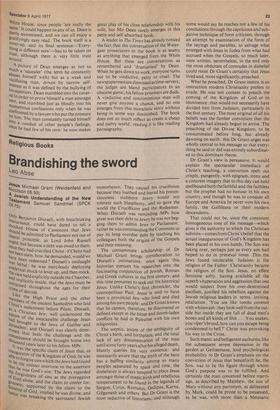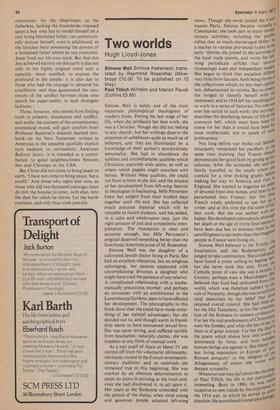Fl eligious Books
Brandishing the sword
Leo Abse
Jesus Michael Grant (Weidenfeld and Nicolson £6.50) Jewish Understanding of the New nesternent Samuel Sandmel (SPCK z.4.75)
Only Benjamin Disraeli, with breathtaking insouciance, could have dared to tell a Shocked House of Commons that Jews should be admitted to Parliament not out of liberal principle, as Lord John Russell n.rged, but because a debt was owed to them, since they had crucified Christ : if Christ had kncn been slain, how, he demanded, would we have been redeemed ? Disraeli's onslaught was lethal : he was mercilessly deploying nalytical shock to lever up, arid then mock, ,he view held explicitly outside the Chamber, ''nd implicitly inside, that the Jews must be ostracised throughout the ages for their crime of deicide. Like the High Priest and the other crt,bers of the ancient Sanhedrin who laid nrist's indictment before Pilate. Disraeli, ,s a Christian Jew, well understood the had of the inescapable challenge Jesus "acl brought to the Jews of Galilee and Jr,e.rusalem: and Disraeli was clearly deter 'ined that both the challenge and the ,,cinsecluence should be brought home two thousand years later to his fellow MPs. .It was the specific claim of Jesus that, as an,dogurator of the Kingdom of God, he was 'le to forgive sins which the Jews had found ;101. be the sinister overtone to the assertion the he Was God's son. The Jews regarded e forgiveness of sins as the prerogative
Of
! God alone, and the claim to confer for
reness, supported by the claim. to the I:3ns* of God, implied he was divine, and hence was breaking the sacrosanct Jewish
monotheism. They caused his crucifixion because they loathed and feared his pretentiousness: stubborn Jewry would not tolerate such blasphemy, and so gave the world the Crucifixion and the Redeemer. When Disraeli was reminding MPs how great was their debt to Jewry he was not begging them to admit Jews to Pat liarnent: rather he was commanding the Commons to pay its long overdue debt by teaching his colleagues both the origins of the Gospels and their meaning.
The consummate scholarship of Dr Michael Grant brings corroboration to Disraeli's intimations; once again this historian pursues his researches into the fascinating conjunction of Jewish, Roman and Greek cultures in the first century, and this time presumes to seek out the historical Jesus. Unlike Christ's first chronicler, the cosmopolitan Paul, Jesus is said to have been a provincial Jew who lived and died among his own people: and Dr Grant knows that he cannot, therefore, be discovered or defined except in the bitter and doom-laden conflicts he had in Palestine with his own religionists.
The sceptic, aware
of the ambiguity of Christ's birth, and birthplace, and the total lack of any documentation of the man until some forty years after his alleged death, bluntly queries his very existence: and necessarily aware that the myth of the hero has a balling similarity among so many peoples separated by space and time, the disbeliever is always tempted to place Jesus amongst those of magic birth and rebellious temperament to be found in the legends of Sargon, Cyrus, Romulus, Oedipus, Karna, Gilgamesh and others. But Dr Grant is the most seductive of historians; and although
some would say he reaches not a few of his conclusions through the capricious and subjective technique of form criticism, through an attempt by examination of the form of the sayings and parables, to salvage what emerged with Jesus in Judea from what had accrued when the Gospels, so much later, were written, nevertheless, in the end only the most obdurate of comrades in disbelief could resist Dr Grant's certainty that Jesus lived and, more significantly, preached.
What he preached, Dr Grant insists, is an instruction modern Christianity prefers to evade. He was not content to preach the coming of the Kingdom of God or its imminence: that would not necessarily have divided him from Judaism, particularly in the first century. The most original of all his beliefs was the further conviction that the Kingdom had already begun to arrive. The preaching of' the Divine Kingdom, to be • consummated before long, but already dawning on earth: this Dr Grant urges was wholly central to his message so that everything he said or did was entirely subordinated to this dominant theme.
Dr Grant's view is persuasive. It would explain the spectacular immediacy of Christ's teaching, a conviction spelt out crisply, pungently, with epigram, irony and -a concrete imagery that to this day can hold spellbound both the faithful and the faithless but the prophet had no honour in his own country, and though he was to conquer all Europe and America he never won his own family, the Gallileans or their modern descendants.
That could not be, since the consistent homogeneous tone of his message—which gives it the authority to which the Christian submits—comes from Christ's belief that the actual inauguration of God's Kingdom has been placed in his own hands. The Son was taking over, perhaps just as every son had hoped to do in primeval times. This the Jews found intolerable. Judaism is the religion of the Father: Christianity became the religion of the Son. Jesus, no effete feminine softy, having available all the superb vituperation and aggression that one would suspect from his over-determined pacifism, justified his rebellion against the Jewish religious leaders in terms inviting retaliation 'You are like tombs covered with whitewash : they look well from the out side but inside they are full of dead men's bones and all kinds of filth ... You snakes, you viper's brood, how can you escape being condemned to hell ?' Christ was provoking his way to the Cross.
Such manic and belligerent outbursts, like the subsequent severe depression in the garden at Gethsemane, lend psychological probability to Dr Grant's emphasis on the conviction of Jesus that henceforth he, the Son, was to be the figure through whom God's purpose was to be fulfilled. And certainly the man conceived before marriage, as described by Matthew, the son of Mary without any patronym, as delineated by Mark, could be prone to be possessed, as he was, with more than a Messianic conviction : for the illegitimate, as the fatherless, lacking the boundaries imposed upon a boy who has to model himself on real living blemished father, can unrestrainedly picture himself, even in adulthood, as the limitless hero possessing the powers of a fantasised father whom he can overcome. Jesus lived out his own myth. But that this Jew achieved eternity on this earth is due not only to his highly original mind and a capacity, never excelled, to express the profound in the simple: it is also due to those who had the courage to demand his crucifixion, and thus guaranteed the continuity of the conflict between those who search for super-reality in such divergent fashions.
Those, however, who shrink from finding truth in polemic, dissonance and conflict, and prefer the cosiness of the contemporary ecumenical mood, will gain comfort from Professor Sandmel's didactic learned textbook on the New Testament written in American in the unsubtle painfully explicit style endemic to rationalistic American Reform Jewry: it is intended as a contribution to good neighbourliness between Jew and Christian in the USA.
But Christ did not come to bring peace to earth. 'I have not come to bring peace, but a swofc12 And those who reject him now, as those who did two thousand years ago. must do him the honour to enter, with élan, into the duel for which he thirsts. Let the battle continue, and only thus truth prevails.

































 Previous page
Previous page